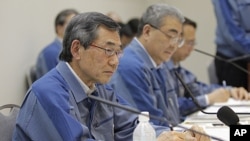The Japanese company that operates the disabled Fukushima Daiichi nuclear power plant has reported an annual loss of just over $15 billion. At a news conference on Friday, Tokyo Electric’s widely criticized president took responsibility for the loss and announced his resignation.
Tokyo Electric owns 17 nuclear reactors throughout Japan, but the problems at Fukushima Daiichi account for the majority of its losses. The world's worst nuclear power accident since the Chernobyl disaster in 1986 has wrecked four reactors at the power plant and is not expected to be under control for at least another five months.
Tokyo Electric President Masataka Shimizu appeared before reporters Friday to disclose the largest ever loss reported by a Japanese company outside of the financial industry.
Shimizu says he will resign to take responsibility for the losses and for damaging the public's trust in the company.
He has been widely criticized in Japan for his leadership in the weeks immediately following the March 11 disaster. Shimizu did not appear in public, shunning Tokyo Electric's numerous news conferences. When it emerged he had been hospitalized for dizzy spells and overwork, there was a drop in public confidence in the ability of the company's top management to handle the crisis.
After the record losses, the outlook for Tokyo Electric is still bleak.
Once Fukushima Daiichi is back under control, the company faces the daunting task of scrapping the four damaged nuclear reactors, cleaning up radioactive contamination that has blanketed the surrounding area, and compensating tens of thousands of people forced to evacuate areas near the plant.
The company must also secure enough energy to avoid rolling blackouts in Tokyo this summer.
The costs are likely to continue rising. Tokyo Electric declined to offer a customary financial forecast for the year ahead.
To reduce losses, the company will sell off non-essential land, reduce staff and research budgets, and cut salaries.
Nuclear safety and the Fukushima disaster are expected to be discussed among Japanese, Chinese and South Korean leaders at their summit in Japan on Saturday and Sunday.
Lee Myung Bak and Wen Jiabao will begin their trip in northern Japan, before heading to Tokyo for talks on issues of mutual concern. They are also scheduled to hold bilateral meetings before adjourning on Sunday afternoon.
Tokyo Electric Reports Historic Loss











